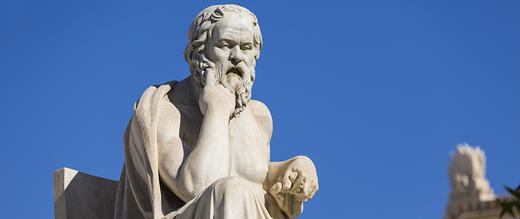The views expressed in our content reflect individual perspectives and do not represent the authoritative views of the Baha'i Faith.
Did you ever wonder where philosophers get their wisdom? When I read Aristotle or Socrates, it amazes me—their insights still seem fresh and relevant today.
Of course, Western culture traditionally traces its origins to those great Greeks, the philosophers of freedom. In most descriptions of the growth and evolution of Western thinking, they’re the seeds that germinated the sapling that became the tree of the entire culture. Their wisdom, insight and deep understanding of the human spirit gave birth to the way we think, the way we act toward each other, and the way we view the world.
For example:
I count him braver who overcomes his desires than him who conquers his enemies; for the hardest victory is over self. – Aristotle
One who is injured ought not to return the injury, for on no account can it be right to do an injustice; and it is not right to return an injury, or to do evil to any man, however much we have suffered from him. – Socrates

Aristotle
For sheer insight into human nature, the ancient Greek philosophers—Plato, Socrates, Aristotle, Pliny, Galen, and others—had an enormous impact in their day, and even up to this day. Some maintain that the entire structure of Western culture is built around their insights. The great scholar and contemporary philosopher Alfred North Whitehead said “The safest general characterization of the European philosophical tradition is that it consists of a series of footnotes to Plato.”
If you trace the historical influence of the classical Greek philosophers, you’ll find that they made a remarkable series of contributions to early Islamic philosophy, and then to the European Renaissance and the Age of Enlightenment, and then to our modern culture. We base much of our governance, our science and our basic way of life on classical Greek philosophy.
So where did the ancient Greek philosophers get their incredible, fertile, deeply wise, long-lived ideas? Were they entirely original, even though few ideas are? Or did the Greeks incorporate ideas from elsewhere into their thinking?
Many students of the period have now reached the conclusion that the conceptual basis of Greek philosophy came from the East. One of the most respected modern scholars in the field, Martin Litchfield West from Oxford, wrote an extensively-researched book on the subject called The East Face of Helicon: West Asiatic Elements in Greek Poetry and Myth. West’s book concluded that a long, rich interaction took place between the Greek and Roman cultures in the pre-Christian period and the prophets and practitioners of Judaism from the East:
Contact with oriental cosmology and theology helped to liberate the early Greek philosophers’ imagination; it certainly gave them many suggestive ideas …
This fascinating conclusion, still the subject of active debate among historians, overturns much traditional Western thinking. What if the underpinnings and the roots of Western culture went back further than the Greeks?
The Baha’i teachings say that they definitely do:
Verily, the philosophers have not denied the Ancient of Days … Consider Hippocrates, the physician. He was one of the eminent philosophers who believed in God and acknowledged His sovereignty. After him came Socrates who was indeed, wise, accomplished and righteous. He practised self-denial, repressed his appetites for selfish desires and turned away from material pleasures. He withdrew to the mountains where he dwelt in a cave. He dissuaded men from worshipping idols and taught them the way of God, the Lord of Mercy, until the ignorant rose up against him. They arrested him and put him to death in prison. Thus relateth to thee this swift-moving Pen. What a penetrating vision into philosophy this eminent man had! He is the most distinguished of all philosophers and was highly versed in wisdom. We testify that he is one of the heroes in this field and an outstanding champion dedicated unto it. He had a profound knowledge of such sciences as were current amongst men as well as of those which were veiled from their minds. Methinks he drank one draught when the Most Great Ocean overflowed with gleaming and life-giving waters. He it is who perceived a unique, a tempered, and a pervasive nature in things, bearing the closest likeness to the human spirit, and he discovered this nature to be distinct from the substance of things in their refined form. He hath a special pronouncement on this weighty theme ….
After Socrates came the divine Plato who was a pupil of the former and occupied the chair of philosophy as his successor. He acknowledged his belief in God and in His signs which pervade all that hath been and shall be. Then came Aristotle, the well-known man of knowledge. He it is who discovered the power of gaseous matter. These men who stand out as leaders of the people and are pre-eminent among them, one and all acknowledged their belief in the immortal Being Who holdeth in His grasp the reins of all sciences. – Baha’u’llah, Tablets of Baha’u’llah, pp. 146-147.
The Baha’i teachings praise the classical Greek philosophers in several places, and also point out that they drew their inspiration from the East. On that theme, Abdu’l-Baha cites the histories of the East:
It is recorded in eastern histories that Socrates journeyed to Palestine and Syria and there, from men learned in the things of God, acquired certain spiritual truths; that when he returned to Greece, he promulgated two beliefs: one, the unity of God, and the other, the immortality of the soul after its separation from the body; that these concepts, so foreign to their thought, raised a great commotion among the Greeks, until in the end they gave him poison and killed him.
And this is authentic; for the Greeks believed in many gods, and Socrates established the fact that God is one, which obviously was in conflict with Greek beliefs. – Abdu’l-Baha, Selections from the Writings of Abdu’l-Baha, p. 54.
We owe a great debt to Socrates and the philosophy he gave us—but perhaps we actually owe that debt to Abraham and Moses, the true founders of the spiritual truths we’ve based our civilizations on.

















Comments
Sign in or create an account
Continue with Facebookor